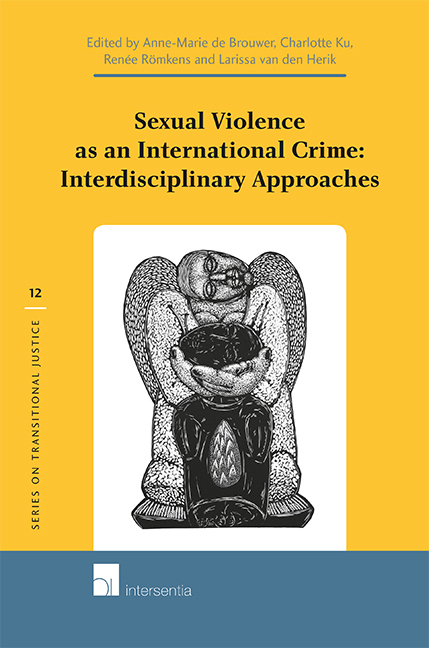Book contents
- Frontmatter
- Acknowledgements
- Foreword
- Contents
- Abbreviations
- INTRODUCTION
- PART 1 OVERVIEW OF SEVERAL MILESTONES AND CHALLENGES CONCERNING INTERNATIONAL CRIMINAL PROSECUTION OF SEXUAL VIOLENCE
- A HISTORICAL PERSPECTIVE, THE WAY FORWARD AND MILESTONES LONG OVERLOOKED
- THE INTERNATIONAL TRIBUNALS AND COURTS
- PART 2 SOCIAL, ARCHIVAL AND MEDICAL DATA COLLECTION AND ITS USE FOR THE CRIMINAL LAW PROCESS: METHODOLOGY ISSUES
- PART 3 SURVIVING SEXUAL VIOLENCE, STORY TELLING AND CREATING AWARENESS
- CONCLUDING REMARKS
- About the Contributors
Chapter 6 - The Prosecution of Rape and Sexual Violence: Lessons from Prosecutions at the ICTR
Published online by Cambridge University Press: 16 December 2020
- Frontmatter
- Acknowledgements
- Foreword
- Contents
- Abbreviations
- INTRODUCTION
- PART 1 OVERVIEW OF SEVERAL MILESTONES AND CHALLENGES CONCERNING INTERNATIONAL CRIMINAL PROSECUTION OF SEXUAL VIOLENCE
- A HISTORICAL PERSPECTIVE, THE WAY FORWARD AND MILESTONES LONG OVERLOOKED
- THE INTERNATIONAL TRIBUNALS AND COURTS
- PART 2 SOCIAL, ARCHIVAL AND MEDICAL DATA COLLECTION AND ITS USE FOR THE CRIMINAL LAW PROCESS: METHODOLOGY ISSUES
- PART 3 SURVIVING SEXUAL VIOLENCE, STORY TELLING AND CREATING AWARENESS
- CONCLUDING REMARKS
- About the Contributors
Summary
INTRODUCTION
The International Criminal Tribunal of Rwanda (ICTR) was established as an ad hoc tribunal in the face of serious violations of international humanitarian law committed in the territory of Rwanda and neighbouring states between 1 January 1994 and 31 December 1994. The establishment of the ICTR was momentous, as it was the first international criminal tribunal with a mandate to adjudicate violations of humanitarian law committed in a non-international armed conflict. The Office of the Prosecutor (OTP) has focused on bringing before the ICTR those persons bearing the greatest responsibility for genocide and violations of international human rights. During the 1994 conflict in Rwanda rape occurred on a massive scale. The ICTR's work has included the prosecution of the crimes of rape and other sexual violence perpetrated during the genocide. The recognition that sexual violence can constitute a war crime, a crime against humanity or a constituent act of genocide has been established in International Law through the work of the ICTR and the International Criminal Tribunal for the former Yugoslavia.
The importance of ending impunity for acts of sexual violence has been stressed by the United Nations to be part of a comprehensive approach towards seeking sustainable peace, justice, truth and national reconciliation. The Security Council has very recently emphasized the responsibility of all States to put an end to impunity and to prosecute those responsible for genocide, crimes against humanity, and war crimes including those relating to sexual and other violence against women and girls. Resolution 1820, passed by the Security Council, requires all Member States to comply with their obligations for prosecuting persons responsible for such acts, to ensure that all victims of sexual violence, particularly women and girls, have equal protection under the law and equal access to justice, recognizing that, “[w]omen and girls are particularly targeted by the use of sexual violence, including as a tactic of war to humiliate, dominate, instil fear in, disperse and/or forcibly relocate civilian members of a community or ethnic group.”
Indeed, the prosecution of sexual violence crimes is a key component to stopping the global violence against women. Rape and other forms of sexual violence must be punished and be seen to be punished, if the cycle of sexual violence and other forms of violence is to be halted.
- Type
- Chapter
- Information
- Publisher: IntersentiaPrint publication year: 2013
- 1
- Cited by

